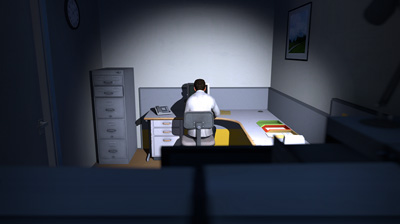Steve’s Gaming Escapades from 2013 (Part 1)
You may not be aware that I play video games. It’s… you know… a thing that I do. Sometimes. After getting burned by the hype that surrounded Final Fantasy VIII (one of my least favourite games of all time) back in 1999, I gave up on paying attention to marketing. I don’t frequently pick up new titles unless the buzz and the appeal is just too much to handle. I’m a slow adopter, and thus some of what I spend my time playing has already been out for decades. I played a good number this year, so lets get started.
I played 28 different games through 2013 (to the best of my recollection), so I thought I’d do a mini review for each of them. Some I highly recommend, and some you should avoid.
In this post we’ll discuss:
- Crayon Physics Deluxe (Android)
- Super Hexagon (Android)
- Scott Pilgrim vs. The World (PS3)
- Antichamber (PC)
- The Stanley Parable (PC)
- Papers Please (PC)
- Dys4ia (PC)
- Skrillex Quest (PC)
- Candy box! (PC)
- FTL: Faster Than Light (PC)
- Rogue Legacy (PC)
- Space Quest 1 (PC)
- Space Quest 2 (PC)
- Space Quest 3 (PC)
Crayon Physics Deluxe (Android)
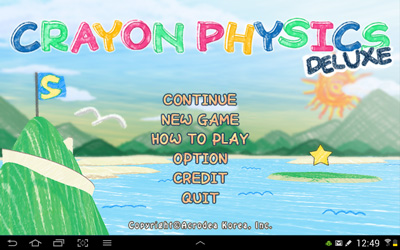 Time Played: ~ 2.5 hours
Time Played: ~ 2.5 hours
I had the fortune of getting a free Samsung Note 10.1 after participating in a Twitter contest in late 2012 run by Samsung Mobile. Along with the tablet came a few pre-installed applications, one of which being Crayon Physics Deluxe. An early version, titled Crayon Physics, won the grand prize at the Independent Games Festival in 2008. It features a heavy emphasis on 2D physics simulations. It’s a rad little time passer for mobile devices (Android and iOS) which appears to be less polished than the Windows/Mac/Linux version. The version I’ve been playing does not come with a level editor, though it does on PC.
Liked: It’s a great little puzzle game that requires imagination instead of quick reactions. It makes sense to have this with the Note 10.1 as it puts the stylus to use. Fun for having on a bus or train as you can pick it up and put it down with no sense of pressure about where you are at in a level. The graphics are incredibly simplistic, yet charming.
Disliked: I don’t think there’s anything inherently bad about the game. It’s a little more simplistic than I personally tend to want out of a gaming experience, and so I think it ended up being a time passer more than something I actively would seek to do. I would say playing on a PC with a stylus would be the best experience, as it’s a little annoying to use either the mouse, or in the case of this mobile version, have to cycle through the various tools by tapping the screen.
Score: ♥♥♥♥♥♡♡♡
Super Hexagon (Android)
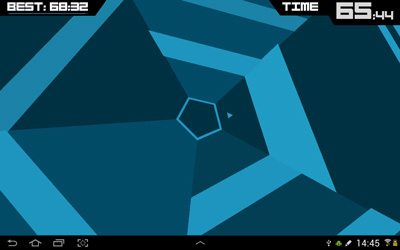 Time Played: More than I can guess
Time Played: More than I can guess
Super Hexagon is a game I’ve mentioned several times before. I don’t remember how I came across it originally… it was likely mentioned in passing as one of those addictive, difficult, indie games that has to be tried. I remember telling Matt about it, and he tried it out on his phone. We were both surprised at how fast we would die. It became a game that I would play for hours, even though an unsuccessful game can last as little as two seconds. The object is quite simple. You are a triangle trapped in a series of shrinking hexagons. You must pivot about the center in order to get through the passages that are available. The controls? You either tap the right side of the screen or the left side of the screen. Your triangle will rotate anti/clockwise depending on which side you touch, and for how long your finger is on the screen. I haven’t played the PC version, but that exists as well.
Liked: It’s insanely difficult. It requires a lot of precision timing, and you will find yourself learning to see from your peripheral vision in order to figure out what’s coming next. Because you’ll die so fast, it’s very easy to get in and out of. Perfect for transit trips, toilet trips, or even on your sofa while your console sits there ignored… weeping that you’re more entranced with this absurdly simple mechanic. Chipzel has some of the best chiptunes I’ve heard out of the Game Boy. Really this is as addictive as Tetris was.
Disliked: It’s insanely difficult.
Score: ♥♥♥♥♥♥♥♥
Scott Pilgrim Vs. The World (PS3)
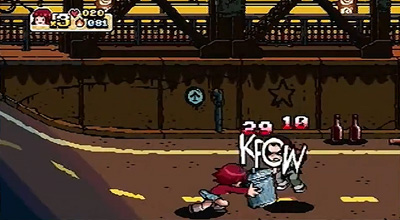
Time Played: ~4.5 Hours
I love the comics, the film, the man behind the world, and of course the PSN game. I never got around to trying out any of the DLC which added multiplayer online and more “stuff”. I played this game back when it came out and then again shortly after moving to San Francisco. It’s a fun beat-em-up inspired by River City Ransom, which was one of my favourite games in the NES era. It also takes place in Rob Ford’s city.
Liked: It’s got classic beat-em-up gameplay that works as well as it ever has. The animation and artwork is all fantastic, and it’s where I first heard Anamanaguchi. The multiple characters to choose from, hidden secrets, and different levels of difficulty all add some variety that makes it worth picking up and playing more than once. It shines when you’ve got some other people to play with too. It’s got a bit of progression too since you can power up by spending the coins you acquire.
Disliked: My biggest complaint is that the game starts off with your characters being very slow. While I like the progression that happens by levelling up your various stats, it brings the excitement level down a notch and means that it’s not as thrilling to start a new game with a friend as it could be. Additionally, with so many things borrowed from River City Ransom, if feels a little disappointingly linear the way the levels all map from left to right.
Score: ♥♥♥♥♥♥♥♡
Antichamber (PC)
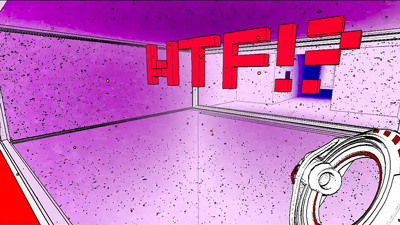 Time Played: ~8 Hours
Time Played: ~8 Hours
Originally known as Hazard: The Journey of Life), Aussie indie dev Alexander Bruce made some real mind fuckery with Antichamber. What started as a multiplayer first player shooter game eventually turned into a single player puzzle game when Alexander decided to start incorporating his bugs into gameplay rather than fighting against them. The puzzles revolve around non-Euclidean space, and force you to think outside the box. Paths will lead you in different directions depending on whether looking away or toward where you’re travelling. It’s bananas. If you liked Portal, you should try this. If you didn’t like Portal because it was too simplistic, you should try this. Really, you should just try this.
Liked: It’s a really unique game that uses familiar mechanics. It forces you to take a different approach to solving puzzles than you’re likely used to, and I found it to be exciting to be in a new world where the laws of physics were so confusing.
Disliked: It was February when I was playing this, and the build I had was still a bit buggy. This led to some crashing that of course isn’t fun, but on the plus side the auto-save feature is pretty solid. I don’t know how much bug fixing has happened since then, but even as buggy as it was when I played I don’t really have any complaints.
Score: ♥♥♥♥♥♥♥♥
The Stanley Parable (PC)
The Stanley Parable is a game that defies description. When I played it, it was still a source engine mod. Simple, but already unique. I got to see a more recent incarnation at PAX when its developer, Davey Wreden wanted to step out for a break and so I took over his booth at the Indie Megabooth. Essentially it’s a game that uses familiar first person shooter type navigation mechanics, but explores a narrative that changes based on whether or not you choose to obey the narration. It’s not a game of cheating death, or accumulating points, but rather an experience that is really tough to explain to someone. Heck, the demo is free on the above linked website, so you you should really consider trying it out.
Liked: The idea behind the game is novel, and it’s really interesting to see how it’s been laid out. The narration is excellent, the writing is great. Gotta love it when an indie developer pulls off something unique and executes it well. It’s a game that needs to have been made.
Disliked: I don’t really know what to say. The demo had my attention, I liked it, I recommend it… yet I think that once it’s been experienced I don’t have a particularly strong desire to revisit it. There’s multiple paths you can take, and so theoretically there is lots of room for replayability… but for some reason I just haven’t picked up the full version.
Score: ♥♥♥♥♥♡♡♡
Papers Please (PC)
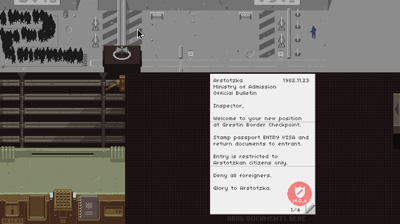 Time Played: ~30 Minutes
Time Played: ~30 Minutes
Another game which I played just the demo for. Papers Please is a game created by Lucas Pope which tasks you with being a border guard for a strict Sovietesque country. Do a good job, and your children will be able to have food and shelter. If you’re caught being sloppy with matching birth dates, names, visa information… well… you’re going to get docked pay, and eventually fired. Harsh.
Liked: It’s a great game that forces you to match information and focus on doing it quickly. There’s lots of humour thrown in there, and it’s a social commentary game that will help you gain a new perspective on life. No, really.
Disliked: Lets face it, this game simulates having a job. A stressful job. This game has since been released with critical acclaim, but I haven’t really had any desire to pick up the full version. If I wanted to have a stressful job, I’d get a stressful job. Or even just a job. I’d recommend you pick up the game when it’s on sale, or at least try out the demo. It’s worth experiencing, but I don’t see myself putting any more time into it.
Score: ♥♥♥♥♥♡♡♡
Dys4ia (PC)
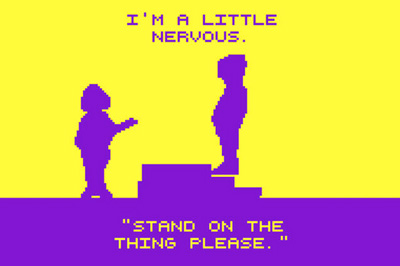 Time Played: ~10 Minutes
Time Played: ~10 Minutes
Well… it’s been debated whether or not this is even a game. Really Dys4ia is more of a short story that is interactive. There is no ability to fail, and really hardly any chance to make any decision at all. So… it’s interesting, and I think it’s worth experiencing… especially since it only will take about 10 minutes of your time to play all the way through. The creator, Anna Anthropy relates her story of going through changing her gender to you, the audience.
Liked: It’s interesting to see someone’s personal experiences splayed out in new ways. It’s free.
Disliked: The graphics make me cringe. I think the experience that the creator wants to give you is cheapened by the fact that it’s a flash game on New Grounds.
Score: ♥♥♡♡♡♡♡♡
Skrillex Quest (PC)
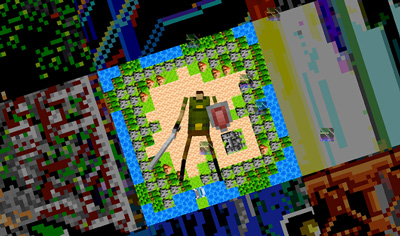 Time Played: ~15 minutes
Time Played: ~15 minutes
Skrillex Quest is a pretty interesting game that is, at its core, simply a viral marketing scheme for Skrillex. It reminds me of Zelda, and also makes use of some old school Dragon Quest graphics. Very cool tip of the hat to old school games, and despite the fact that I know full well it’s an advertisement, I will recommend it to you.
Liked: It’s a cool little game that plays in your web browser. It’s got some nostalgia factor built in, and the music works. There are definitely worse ways Skrillex could get exposure. I’ve never really listened to him, and this got me to at least pay attention to him.
Disliked: There’s not really anything wrong with it. It’s a quick advertisement for Skrillex’s music. I don’t know that I’d want to play this again, or have a full-length version to play… but that’s probably ok since that isn’t it’s goal.
Score: ♥♥♥♥♥♥♡♡
Candy box! (PC)
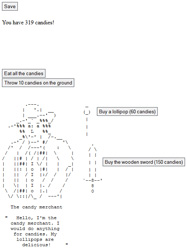 Time Played: I couldn’t even guess.
Time Played: I couldn’t even guess.
“Candy box!” was a pretty simple browser based role-playing game featuring ASCII art. It was a project from a 19 year old French student that went viral in April. It was surprisingly appealing once you got into it, and required leaving your browser open to accumulate candy in real time simply by waiting. Once you’ve got enough candy you can start a farm, and go on quests to grow your wealth and power even more. It doesn’t require very much active play, and thus is something that could occupy some down time at work. I haven’t given the new version a shot yet, but here it is in case you want to give it a spin.
Liked: Simple mechanics that are addictive. It’s silly in nature and so easy to just have fun with. There is a little bit of skill involved with the final boss. The ASCII art is a clever idea. I was surprised to find myself keeping my browser open for a few days straight in order to collect candies and lollipops.
Disliked: I see no faults with it. It’s simple, requires little investment, and feels satisfying. It’s a very simple browser game that at the price of free, is worth every cent.
Score: ♥♥♥♥♥♥♡♡
FTL: Faster Than Light (PC)
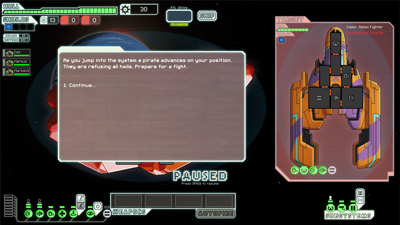 Time Played: ~98 hours
Time Played: ~98 hours
FTL is a top-down real time strategy game created by Subset Games (an indie team that was just 4 people). It’s a painfully addictive rogue-inspired game that is quite challenging. You essentially take the captain’s seat in a space ship on an urgent mission to Federation headquarters, while rebels are hot on your tail. You’ll be making decisions as to whether to leave desperate aliens stranded on planets, whether to steal precious cargo that was trusted to you to deliver, you may discover a long-forgotten alien race, and you’ll no doubt have to fend off space pirates to board your ship without warning. You’ll be fighting in asteroid fields, near flaring suns, and in dark nebulae. The process of managing ship resources and telling crew how to carry out their orders may seem boring at first glance, but once battle starts you’ve got very little time to make decisions. Later this month, Subset intends on releasing an ipad version as well as an update to the PC version which will include new mechanics, maps, and ships.
Liked: The game is very addictive. Because of it’s rogue-like nature, the game never plays the same exact way twice. The graphics while simplistic, do their job, and Ben Prunty’s music really makes the game sing. It’s very challenging, and once you clear it on easy, the game’s normal mode really will get you working.
Disliked: The random number generator can be a bitch. I’ve had it happen twice where I just could not complete a sector as the beacons were not close enough to the exit. Trying to unlock the crystal ship, or get the gear that you need can also prove frustratingly futile, and sometimes you’ll get wiped with just no chance. Other times you may get to coast with encounter after encounter being exactly what you need. Due to the randomness of events I actually found myself wishing that the game had a free-to-play mechanic that would let me buy new ships. Wishing for micro-transactions, to me, isn’t something I’m happy about. Luckily a 3rd party made a profile editor that can let you unlock ships once you get sick of the RNG being against you.
Score: ♥♥♥♥♥♥♥♥
Rogue Legacy (PC)
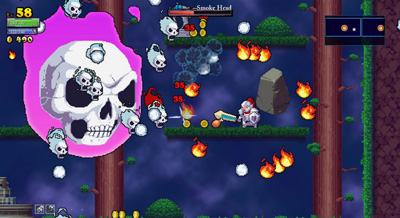 Time Played: ~16 hours
Time Played: ~16 hours
Like FTL, Rogue Legacy uses a rogue-like formula to create a game that is different each time you play it. It also uses game design that’s quite similar to Castlevania to make a fun, challenging 2D platformer experience. It’s best played with a controller and offers variety to the control by randomly assigning genetic mutations to each character that you play with: colour blindness, dwarfism, gigantism, stereo blindness, and many others. It also breaks the rogue formula a little by allowing you to accumulate wealth through your playthroughs. This allows for unlockable professions, equipment, and skills.
Liked: I love metroidvanias. I was skeptical of the procedural level generation at first, but it was a fun game. The animation had charm to it, and it was great working my way through to completion.
Disliked: I don’t really recall having any complaints with the game. It would be great if there were more zones. Part of what I like about Metroidvania games is the large sprawling maps, though it’s pretty understandable having it limited to 5 bosses, given that it’s an indie game.
Score: ♥♥♥♥♥♥♥♡
Space Quest 1 (PC)
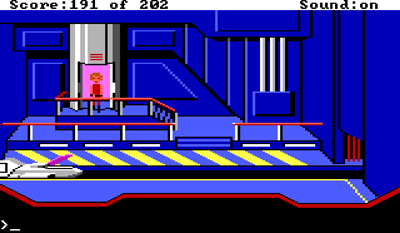 Time Played: ~3 hours
Time Played: ~3 hours
Created in October of 1986, Space Quest was part of the early Sierra adventure games. The manual for it really talks it up better than I can: “A 3-D animated adventure game is an illustrated story in which YOU are the hero. Stepping through an enchanted door into your computer, you BECOME Roger Wilco, the main character [you can ever rename him with your name, or any other name that strikes your fancy]. Your character is fully animated, but YOU move him around the three-dimensional scenes. Use a joystick or the arrow keys on your computer to move in and about the different areas of the game. Detailed exploration is one of the keys to success in any adventure game.”
Wow. Amazing, right? This era of computer games was pretty stellar, and I really enjoyed working through adventure games that had a text parser. I’d never played the Space Quest games before, so revisiting this was awesome. Also, can you believe ZZ Top and Toys R Us both sued Sierra for parodying them in this game?
Liked: How could you not love those old vector graphics? The harsh crisp lines and bright colours are a large part of the charm for me. I also love text parsers. To me, figuring out what to get the character to do by typing was part of the fun. Space Quest had some great cheesy humour as well.
Disliked: Sometimes it’s tricky to figure out what’s going on in older games. The beginning sequence has a timer involved that you can’t see. When I would fail, it took me a while to realize that the only solution would be to restart, and not to figure out what I was doing wrong in the current room. The same thing happened later when I forgot to carefully search everything for items that I may need later. Sometimes these games would force you to retrace steps from very early on in order to finish the game. Sierra made a lot of their money by selling hint books for good reason.
Score: ♥♥♥♥♥♥♥♡
Space Quest 2 (PC)
 Time Played: ~3 hours
Time Played: ~3 hours
That’s right… immediately after polishing off Space Quest 1, I was forced to take on its sequel. Scott Murphy and Mark Crowe were a great team of developers, and I had a blast with the first game. The second one is more refined and, to me, more enjoyable. The game mechanics are all the same as the first one. Text parser adventure game.
Liked: Really, everything about the first game is present here as far as graphics, writing, and mechanics. It’s probably a little easier to figure out what to do in this game, and I don’t think the game suffers because of it.
Disliked: I have no complaints.
Score: ♥♥♥♥♥♥♥♥
Space Quest 3 (PC)
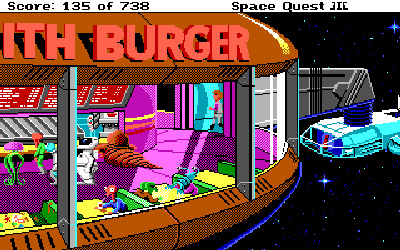 Time Played: ~2 hours
Time Played: ~2 hours
From 1989, we have the third sequel to the Space Quest series. While the Kings Quest games didn’t seem to maintain any continuity from game to game, Space Quest’s story kept growing. The gameplay was for the most part the same as the previous two, but also featured some more actiony elements that got the heart racing. From outrunning a Terminator, space combat, janitorial espionage, to mech suit boxing… this game had it all.
Liked: The graphics really were improving here. They upgraded to dithered shading, better animation, cinematic cut scenes, and even different camera angles. You can tell they were pushing the envelope here. The music is a nice touch too. All around a very solid game.
Disliked: Mark and Scott, had been referring to themselves as the Two Guys from Andromeda by this point in their careers. I personally wasn’t a fan of them placing themselves into the game. Other than that, it was a solid game.
Score: ♥♥♥♥♥♥♥♥





































